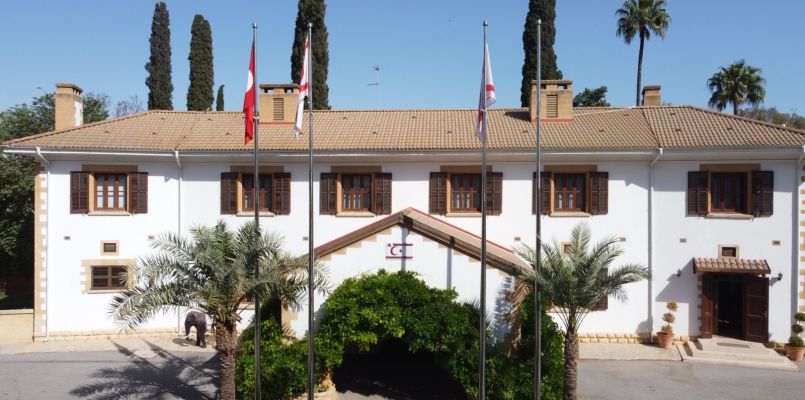STATEMENT OF THE TRNC PRESIDENCY ON THE RESOLUTION ADOPTED BY THE UN SECURITY COUNCIL TODAY (30 JANUARY 2023)

President Tatar, upon his election, has put forward his realistic vision for
the resolution of the Cyprus issue, which has remained unresolved for over
half a century. Nevertheless, parts of the resolution adopted today by the
UN Security Council, which refer to the basis of the negotiations,
overlooked, once again, the realities on the ground, thereby contributing to
the maintenance of the status quo. The resolution has demonstrated, yet
again, that the Security Council is content with the status quo and is not
genuinely interested in the solution of the problem that needs to be based
on the inherent equality of the two Sides in Cyprus.
The reference in the resolution to a new political process, which merely
repeats the old and exhausted basis from which the Turkish Cypriot side has
withdrawn its consent, is unacceptable. We would like to reiterate that
negotiations on this exhausted basis, held by Leaders from all ends of the
political spectrum, without any success, have been the main culprit for the
continued denial of the inherent rights of the Turkish Cypriot People and
the inhumane isolation imposed on them for over half a century, as well as
the unjust and unlawful representation of the whole island only by the Greek
Cypriot side, within the framework of a sanctioned illusion.
The fundamental rule that must be observed prior to starting any meaningful
negotiation for the resolution of a dispute is the need for the conflicting
parties to agree on the basis on which they will negotiate. The lack of
common ground between the two Sides to start a new and formal negotiation
process is also confirmed by the UN Secretary-General and by the Security
Council through its endorsement of the UN Secretary-General's report in
which he clearly recorded this fact. The Turkish Cypriot People will not
allow its future to be dictated through imposed basis or settlement models
in contravention to our inherent rights. We expect the international
community, which purports to support the settlement of the Cyprus problem,
to uphold a new mutually accepted common ground and to refrain from using
expressions that serve the maintenance of the status quo.
As the Turkish Cypriot Side, we have repeatedly expressed, both orally and
in writing, that we are ready to start a new and official negotiation
process following the confirmation of our inherent rights, which are our
sovereign equality and equal international status. We would like to take
this opportunity to extend our President's call to the upcoming Greek
Cypriot Leader that he is ready to engage in formal negotiations to reach a
just and sustainable solution to the Cyprus problem based on the
confirmation of our aforesaid inherent rights.
While efforts are ongoing to determine whether there is common ground or
not, the Turkish Cypriot Side proposed, without any preconditions, six areas
of cooperation, through two letters, dated 1 July 2022 and 8 July 2022, that
were conveyed to the Greek Cypriot Side through the kind facilitation of the
UN Secretary-General. Our proposals, based on a win-win approach and also
welcomed by the international community, were intended to serve the welfare
of both the Turkish Cypriot People and the Greek Cypriot People, as well as
the stability of the Island of Cyprus and the region. The significance of
these proposals could not be overlooked by the Greek Cypriot Side either,
which has made them postpone their official response to this day. Sadly, the
Security Council resolution of 30 January 2023 has overlooked the vital
significance of these constructive cooperation proposals. Our proposals,
which are prepared in a comprehensive manner, encompass not only substance,
but also the modality through which cooperation between the two equal Sides
can meaningfully and effectively take place. While all of the areas of
cooperation we have proposed are equally significant and urgent, some of
them need to be addressed as a matter of urgency. President Tatar attaches
great significance to cooperation which he sees as indispensable and will
continue his efforts for the realization of these areas of cooperation. We
would like to reiterate once again that we are ready to take concrete steps
towards the implementation of projects that will touch upon the lives of the
Turkish Cypriot People and the Greek Cypriot People alike.
In a similar context, the Turkish Cypriot Side shall continue to support the
activities and concrete cooperation projects of the bilateral Technical
Committees aimed at improving the daily lives of the two Peoples and
preparing the ground for settlement.
The references in the report regarding the closed part of Maraş reflect the
resistance of the international community towards change. Inevitable change
reflecting the facts on the ground, which started with our Maraş opening,
will continue to encompass other areas. Keeping Maraş closed and abandoned
is tantamount to guarding the status quo in total disregard to the claims of
its former inhabitants.
Why did Maraş/Varosha remain closed until 2020? The responsibility lies with
the Greek Cypriot Side and the international community that yielded to their
intransigence. As it is the case with our position regarding the political
process, the Turkish Cypriot People will determine its own future and will
not allow any part of TRNC territory to be subject to the will of others.
The fact that former inhabitants of Maraş have applied to the
internationally-sanctioned Immovable Property Commission (IPC), which is
currently evaluating these applications, demonstrate the wide acceptance of
our policy. Opposing these initiatives is not only tantamount to violation
of rights, but also amounts to denial of justice.
The trade of a few categories of processed food of non-animal origin of
symbolic value, following their unjustified restriction for more than a
decade, has been depicted as an achievement in the resolution. A real
success story can only be declared when Turkish Cypriot producers can
conduct preferential trade with international markets without any
restrictions. In this respect, responsibility falls on the international
community to ensure that all restrictions imposed on Turkish Cypriots are
duly lifted. The newly introduced obstacles by the Greek Cypriot immigration
officers during the last six months at the crossing points constitute a
significant impediment to economic cooperation. Initiatives to overcome
these obstacles are ongoing in consultation with our relevant authorities.
In the resolution, the omission to refer to the inhuman isolation imposed on
the Turkish Cypriot People for decades is merely an attempt to conceal the
responsibility that rests with the culprits.
The 1960 partnership Republic of Cyprus, established with the consent of the
two Peoples exercising their sovereign equality, was transformed into a
Greek Cypriot state, through the use of arms in 1963, and as such cannot
legitimately have authority or jurisdiction over the Turkish Cypriot People
or the Island of Cyprus. Given the fact that UN Force in Cyprus (UNFICYP)
has been operating only with the consent of the Greek Cypriot leadership, a
legal basis has to be found for its operations in the TRNC. To that end, a
draft Status of Forces Agreement, which has been prepared by our Ministry of
Foreign Affairs, was conveyed to UN officials in New York. Negotiations to
find a mutually acceptable agreement are currently ongoing. Notwithstanding
this development, and the fact that the UN has already submitted its draft
agreement in response, the failure of the Security Council to reflect these
realities, instead extending the operations of UNFICYP for another year,
does not reflect good faith. Given the fact that UNFICYP has been operating
within the territory of the TRNC on the basis of our good will, the stance
of the UN is nothing but an abuse of the ongoing process. It is the
expectation of President Tatar that a mutually acceptable agreement is
reached as a matter of urgency.
We are determined to continue our diplomacy-oriented policy with a view to
reaching a just and sustainable settlement, without prejudicing our inherent
rights and interests. This will serve the urgent cooperation, security and
stability needs of the two Sides, as well as those of the Eastern
Mediterranean region and Europe as a whole.

